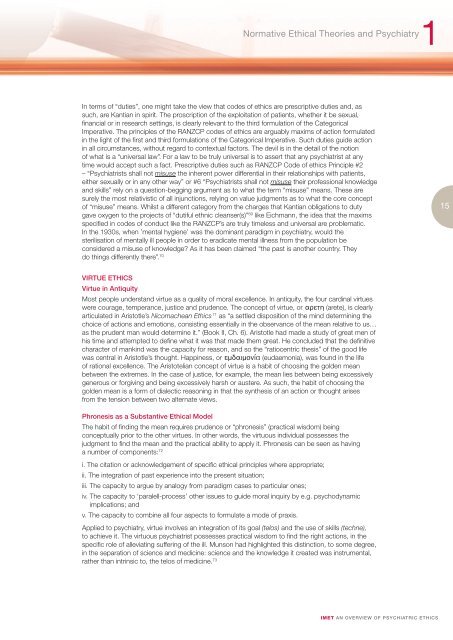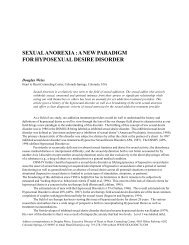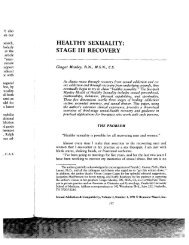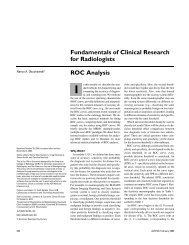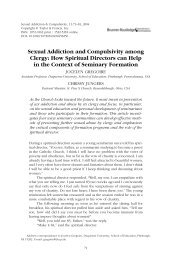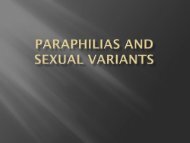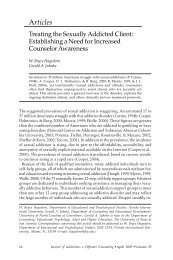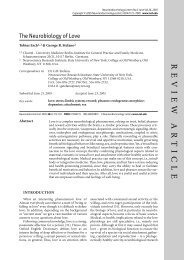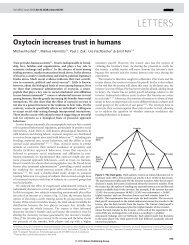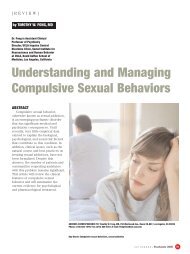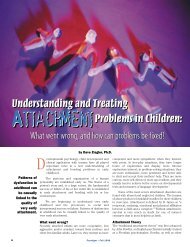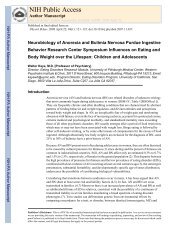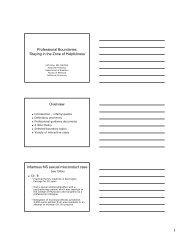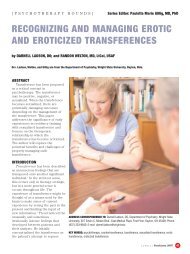An Overview of Psychiatric Ethics
An Overview of Psychiatric Ethics
An Overview of Psychiatric Ethics
You also want an ePaper? Increase the reach of your titles
YUMPU automatically turns print PDFs into web optimized ePapers that Google loves.
Normative Ethical Theories and Psychiatry1In terms <strong>of</strong> “duties”, one might take the view that codes <strong>of</strong> ethics are prescriptive duties and, assuch, are Kantian in spirit. The proscription <strong>of</strong> the exploitation <strong>of</strong> patients, whether it be sexual,financial or in research settings, is clearly relevant to the third formulation <strong>of</strong> the CategoricalImperative. The principles <strong>of</strong> the RANZCP codes <strong>of</strong> ethics are arguably maxims <strong>of</strong> action formulatedin the light <strong>of</strong> the first and third formulations <strong>of</strong> the Categorical Imperative. Such duties guide actionin all circumstances, without regard to contextual factors. The devil is in the detail <strong>of</strong> the notion<strong>of</strong> what is a “universal law”. For a law to be truly universal is to assert that any psychiatrist at anytime would accept such a fact. Prescriptive duties such as RANZCP Code <strong>of</strong> ethics Principle #2– “Psychiatrists shall not misuse the inherent power differential in their relationships with patients,either sexually or in any other way” or #6 “Psychiatrists shall not misuse their pr<strong>of</strong>essional knowledgeand skills” rely on a question-begging argument as to what the term “misuse” means. These aresurely the most relativistic <strong>of</strong> all injunctions, relying on value judgments as to what the core concept<strong>of</strong> “misuse” means. Whilst a different category from the charges that Kantian obligations to dutygave oxygen to the projects <strong>of</strong> “dutiful ethnic cleanser(s)” 69 like Eichmann, the idea that the maximsspecified in codes <strong>of</strong> conduct like the RANZCP’s are truly timeless and universal are problematic.In the 1930s, when ’mental hygiene’ was the dominant paradigm in psychiatry, would thesterilisation <strong>of</strong> mentally ill people in order to eradicate mental illness from the population beconsidered a misuse <strong>of</strong> knowledge? As it has been claimed “the past is another country. Theydo things differently there”. 7015VIRTUE ETHICSVirtue in <strong>An</strong>tiquityMost people understand virtue as a quality <strong>of</strong> moral excellence. In antiquity, the four cardinal virtueswere courage, temperance, justice and prudence. The concept <strong>of</strong> virtue, or rrrrrrrrrr(arete), is clearlyarticulated in Aristotle’s Nicomachean <strong>Ethics</strong> 71 as “a settled disposition <strong>of</strong> the mind determining thechoice <strong>of</strong> actions and emotions, consisting essentially in the observance <strong>of</strong> the mean relative to us…as the prudent man would determine it.” (Book II, Ch. 6). Aristotle had made a study <strong>of</strong> great men <strong>of</strong>his time and attempted to define what it was that made them great. He concluded that the definitivecharacter <strong>of</strong> mankind was the capacity for reason, and so the “ratiocentric thesis” <strong>of</strong> the good lifewas central in Aristotle’s thought. Happiness, or rrrrrrrrrrrrrrrr (eudaemonia), was found in the life<strong>of</strong> rational excellence. The Aristotelian concept <strong>of</strong> virtue is a habit <strong>of</strong> choosing the golden meanbetween the extremes. In the case <strong>of</strong> justice, for example, the mean lies between being excessivelygenerous or forgiving and being excessively harsh or austere. As such, the habit <strong>of</strong> choosing thegolden mean is a form <strong>of</strong> dialectic reasoning in that the synthesis <strong>of</strong> an action or thought arisesfrom the tension between two alternate views.Phronesis as a Substantive Ethical ModelThe habit <strong>of</strong> finding the mean requires prudence or “phronesis” (practical wisdom) beingconceptually prior to the other virtues. In other words, the virtuous individual possesses thejudgment to find the mean and the practical ability to apply it. Phronesis can be seen as havinga number <strong>of</strong> components: 72i. The citation or acknowledgement <strong>of</strong> specific ethical principles where appropriate;ii. The integration <strong>of</strong> past experience into the present situation;iii. The capacity to argue by analogy from paradigm cases to particular ones;iv. The capacity to ‘paralell-process’ other issues to guide moral inquiry by e.g. psychodynamicimplications; andv. The capacity to combine all four aspects to formulate a mode <strong>of</strong> praxis.Applied to psychiatry, virtue involves an integration <strong>of</strong> its goal (telos) and the use <strong>of</strong> skills (techne),to achieve it. The virtuous psychiatrist possesses practical wisdom to find the right actions, in thespecific role <strong>of</strong> alleviating suffering <strong>of</strong> the ill. Munson had highlighted this distinction, to some degree,in the separation <strong>of</strong> science and medicine: science and the knowledge it created was instrumental,rather than intrinsic to, the telos <strong>of</strong> medicine. 73IMET AN OVERVIEW OF PSYCHIATRIC ETHICS


